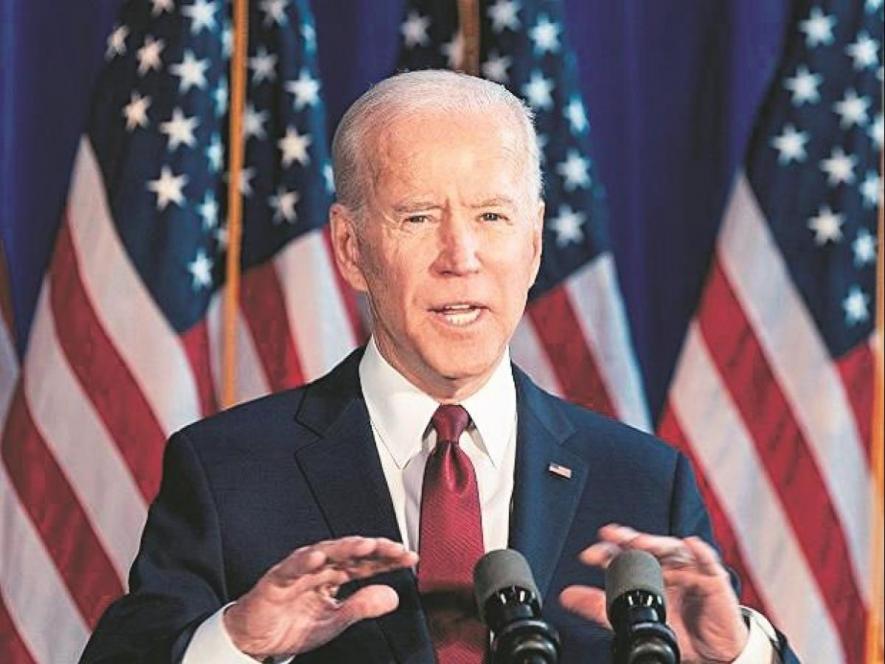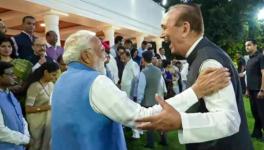Biden Returns to Time Past in Gulf

The extraordinary sight of the Joe Biden administration’s entire foreign and security policy establishment representing Washington on the occasion of the passing away of the emir of Abu Dhabi and president of the United Arab Emirates, Sheikh Khalifa bin Zayed al-Nahyan, conveys a powerful message. Decoding that message may seem deceptively simple.
The US delegation led by Vice President Kamala Harris included Secretary of State Antony Blinken, Defence Secretary Lloyd Austin, Climate Envoy John Kerry, and CIA Director Bill Burns. Prima facie, this excessive act signals a keen desire to improve relations with the UAE, which has been an anchor sheet of US regional strategies for decades.
Biden realises that the US’ regional policy has withered away during his presidency. Candidate Biden passionately advocated the promotion of democracy and human rights but is now backtracking after the UAE and Saudi Arabia began pushing back.
Biden is aghast that his predecessor Donald Trump is still the toast of the town for the sheikhs who are pining for the latter’s return in 2024. The Wall Street and the military-industrial complex is unhappy that Biden may kill the goose that laid the golden egg. Biden is also annoying Israel and the Gulf Arab allies over his decision to engage with Iran. Saudi Arabia and the UAE are disillusioned that the US is unable or unwilling to protect them from the Houthis of Yemen.
Of course, Biden is not to be blamed entirely. The neo-conservatives in his team do not understand Arabs. Perhaps, this was the first time ever that a Saudi Crown Prince shouted down a visiting US National Security Advisor — for broaching human rights issues with him and seeking accountability for Jamal Khashoggi’s killing.
This is not a cultural issue really, as other Western leaders do rather well in the region. French President Emmanuel Macron has done remarkably well, even snatching a massive multi-billion dollar deal for fighter jets with the UAE, right from Biden’s nose-tip while Blinken made Abu Dhabi’s burgeoning ties with China a pre-condition for moving forward on arms supplies.
French President Emmanuel Macron met UAE President Sheikh Mohamed bin Zayed Al Nahyan (R), Abu Dhabi, May 16, 2022
In strategic terms, in fairness to Biden, geopolitics also became volatile. No matter the denouement in Ukraine, West Asian countries are in no mood to help the US to “erase” Russia. Like the ASEAN, the GCC won’t take sides. But unlike in Southeast Asia, the US has a massive military presence in West Asia. Indeed, this is a crisis situation.
Meanwhile, Washington went haywire assuming that West Asia is no longer a priority as the Indo-Pacific strategy became the all-consuming concern. This fallacy has been upended overnight, as Biden’s obsessive need to isolate and weaken Russia critically depends on destroying the OPEC+ which Moscow uses with devastating effect to coordinate with the oil producing countries. Oil trade is Russia’s main source of income, and the higher the price of oil, the more buoyant Kremlin politics becomes. West Asian oil is crucial for weaning Europe away from its heavy dependence on Russian energy.
The West Asian countries have so far stonewalled Washington’s entreaties and continue to work with Russia in the OPEC+ format. The OPEC warns against any EU oil sanctions against Russia. (The UAE foreign minister visited Moscow after the Russian operation began in Ukraine.)
Of course, petrodollar is a key pillar of the Western banking system and props up the dollar as the world currency. However, Saudi Arabia is already discussing part of its huge oil trade with China to be conducted in yuan currency and Egypt plans to issue bonds in yuan. The UAE has a currency swap arrangement with China.
Thus, Biden decided that a reset with the UAE is an imperative need. The big question is about the calibration of the reset. The high-level delegation sent to Abu Dhabi shows where the administration’s priorities. Washington is reiterating emphatically the US’ commitment to the security of the UAE. This translates as future weapons sales as well as assuaging the UAE’s security concerns. Will this prioritisation go far enough to meet the Saudi-Emirati expectation of an Article 5 type formal security guarantee by Washington? That is the million dollar question. There is no question that the UAE has profound issues with the restoration of the 2015 nuclear agreement with Tehran and the lifting of sanctions.
But then, if the US concludes a formal Article 5 security agreement with the UAE, there is bound to be similar demand from Saudi Arabia, Qatar, etc. And as it is, the US is overstretched in Europe and the Indo-Pacific. Make no mistake, Saudi Arabia is also tiptoeing toward a historic transition. The paradox is, Washington also worries that the Saudis and Emiratis may well turn to China and Russia for future weapons sales, which would further weaken the US’ regional influence in West Asia.
Fundamentally, there is a contradiction here. The big message coming out of the dispatch of such a high-level delegation to Abu Dhabi is that the Biden Administration is returning to the old strategies pivoted on the US’ alliance with Israel, the UAE and Saudi Arabia where the leitmotif is the containment of Iran. How this pans out bears watch, given Iran’s close ties with Russia (and China.)
Israel’s de-confliction arrangement with Russia in Syria has unravelled following its somersault on Ukraine (under US pressure.) Surely, it isn’t a coincidence that for the first time, Russia fired the S-300 missiles to thwart an Israeli attack on Syria even as a high-level US delegation was visiting the region.
The bottom line is that the US-Russia confrontation in Ukraine is casting shadows on West Asian region. The Kremlin spokesman Dmitry Peskov implied in a remark on Tuesday that the US, an “unfriendly” in Moscow’s description so far is more appropriately called a “hostile” country. It is against such a complex backdrop that the Biden administration’s attempt to reset the US’ ties with the UAE, a major West Asian ally, needs to be weighed.
The presence of Austin and Burns in Harris’ delegation — way beyond the protocol requirement — will be carefully noted in Moscow. They are the kingpins of Biden’s strategy to “bleed” Russia and weaken it forever on the world stage.
MK Bhadrakumar is a former diplomat. He was India’s ambassador to Uzbekistan and Turkey. The views are personal.
Get the latest reports & analysis with people's perspective on Protests, movements & deep analytical videos, discussions of the current affairs in your Telegram app. Subscribe to NewsClick's Telegram channel & get Real-Time updates on stories, as they get published on our website.























